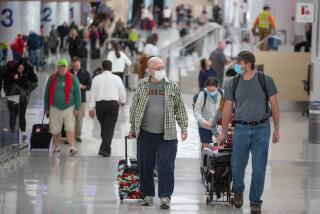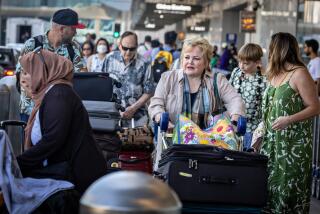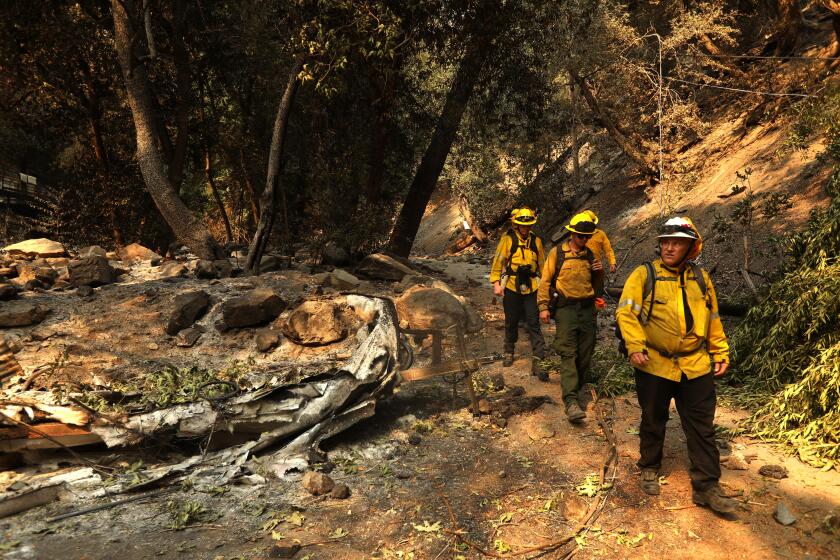News from around the world
LaHood: Tarmac delay rule to be strongly enforced
WASHINGTON Transportation Secretary Ray LaHood sent a message Tuesday to airlines who might be tempted to violate his department’s new three-hour limit on tarmac strandings: Do so at your peril.
“There will be strong enforcement,” LaHood told reporters in a conference call. “I just think that has to part of our plan to make sure that passengers understand and that airlines understand we’re serious about this.”
LaHood sidestepped a question about whether he will seek the maximum fine against airlines that break the rule -- $27,500 per passenger. But he pointed to his department’s recent $16.4 million fine against Toyota for its slow response to sticking gas pedals as an indication of his inclination.
“I don’t think anybody thinks that Ray LaHood is not going to have strong enforcement,” he said.
The rule limiting to three hours the amount of time airlines can keep passengers waiting in planes on tarmacs goes into effect on Thursday. After three hours, planes must return to a gate unless the flight’s captain decides its unsafe to do so or it would interfere with airport operations. The rule also requires airlines to provide passengers with working toilets and, after two hours, food and water.
Airlines have complained that they may be forced to cancel flights, causing passengers to rebook flights and creating greater inconvenience than if they had continued to wait onboard for clearance to take off.
Last week, LaHood turned down requests from five airlines for temporary exemptions to the three-hour limit at congested New York, New Jersey and Philadelphia airports.
LaHood said Tuesday that it’s important the new rule be applied consistently. He noted that the rule applies only to domestic flights and will not affect international flights.
Airlines that violate the three-hour rule are supposed to report their violations to the Transportation Department, LaHood said. If they don’t, their passengers probably will, he said.
Airlines intend to comply with the three-hour limit, said Elizabeth Merida, a spokeswoman for the Air Transport Association, which represents major airlines.
“We’re just not going to violate it, plain and simple,” Merida said. “We do think it will lead to unintended consequences.”
LaHood announced the new rule in December. Once it became clear that the Transportation Department was determined to follow through on the three-hour limit, airlines began making adjustments to their operations, Merida said.
The impetus for the new rule was a Continental Express flight that was diverted to Rochester, Minn., last August due to thunderstorms. Forty-seven passengers were kept overnight in a cramped plane because employees of another airline refused to open a gate so that they could enter the closed airport terminal.
___
On the Net:
Transportation Department https://www.dot.gov
Air Transport Association https://www.airlines.org
Sands opens Singapore’s second casino-resort
SINGAPORE Singapore’s second casino-resort opened Tuesday, a massive $5.7 billion project by Las Vegas Sands Corp. that aims to makeover the city-state as a Southeast Asian gambling and tourism magnet.
After big cost overruns and months of delays, the casino, more than a third of 2,500 hotel rooms and parts of a shopping mall and convention center were opened. A 1.2-hectare (3-acre) SkyPark connecting the tops of three 55-story hotel towers should open on June 23 while a theater opens in October and a museum in December.
The resort, known as the Marina Bay Sands, remakes Singapore’s skyline, forming the far side of a marina facing the downtown area and what the government envisions will be a must-see tourist attraction. Officials also hope the casinos will revamp Singapore’s image as an efficient but sterile manufacturing and financial center that’s better known for strict laws including a ban on chewing gum and caning for minor offenses.
“There’s no other casino this big right in the middle of a downtown,” said Aaron Fischer, an analyst with CLSA in Hong Kong. “It’s not comparable to anything.”
The Marina Bay and Genting’s Resorts World Sentosa, which opened Singapore’s first casino in February, are making the island nation the gambling capital of Southeast Asia.
The two casinos will generate combined income of as much as $3.5 billion next year, or more than half of Las Vegas’s $6 billion of annual gambling revenue, Fischer said.
“The appetite to gamble in Asia is huge,” he said.
In Macau, a Chinese gambling enclave, the average bet at its casinos is $40 while in Las Vegas it’s $5 to $10. VIP guests, which are two-thirds of Macau’s $20 billion gambling market, average $10,000 per bet, Fischer said.
“There’s enough room in Asia for five to ten Las Vegases,” Sands Chief Executive Sheldon Adelson told reporters after the opening. “Chinese culture and Asian culture aren’t going to change.”
The Singapore government, which forbade casinos for decades, has sought to lessen the damage of problem gambling by charging citizens and permanent residents 100 Singapore dollars ($73) per day or SG$2,000 a year to enter a casino.
Hundreds of curious Singaporeans and tourists streamed into the hotel’s main atrium after the doors opened at 3:18 p.m., eight being considered a good luck number in Chinese culture.
“My wife and her sister wanted to see it so they dragged me along,” said Kent Wong, a 45-year-old Singaporean. “The hotel is impressive, but I’m not paying $100 to go to the casino.”
Marina Bay, the world’s second-most expensive casino-resort behind MGM Mirage’s CityCenter in Las Vegas, was initially scheduled to begin operations in December, but the opening was pushed back to February and then to April because of heavy rains and the bankruptcy of some of the project’s subcontractors, according to Sands.
The project is $2 billion over budget, and Sands expects to earn back its investment in five years, said Sands Chief Executive Sheldon Adelson.
Once completed, Marina Bay will feature art works worth $50 million, 300 luxury retail stores and a convention center that can accommodate 45,000 delegates.
“This is the future of gaming,” Adelson said. “This is a new model of entertainment.”
Las Vegas Sands also owns the Sands Macau and the Venetian Macau along with the Sands Casino Resort Bethlehem in Pennsylvania and the Venetian and the Palazzo in Las Vegas.
Cruise line CEO looking favorably at Alaska market
SEATTLE Holland America Line is going to look far more favorably at bringing more vacationers to Alaska now that the state’s passenger head tax has been reduced, the president and CEO of the company said Monday.
The Seattle-based cruise line has long since decided how many ships to devote to Alaska this year and next. But CEO Stein Kruse said pro-business actions this year by Alaska Gov. Sean Parnell and the state Legislature “will certainly be a positive influencing factor” as the company makes its deployment decisions for 2012.
“I can’t say right here and today what we will do because those decisions haven’t been made, but I can tell you that it’s a far more positive outlook than it has been for the last couple of years,” Kruse said.
He spoke in an interview with The Associated Press on the bridge of the Holland America liner MS Amsterdam, which made a half-day call in Seattle as it wraps up a world cruise. Kruse stopped by to visit with Capt. Olav van der Waard and crew members of the 1,380-passenger ship, which next week begins a series of 14-day cruises from Seattle to Alaska.
A few hours before adjourning last week, Alaska lawmakers passed a bill to lower the state head tax from $46 a passenger to $34.50. The measure was heavily pushed by Parnell and was key to a settling a federal lawsuit filed by the Alaska Cruise Association against the state.
The association has blamed state regulations and tax costs for the expected loss of three ships and about 142,000 passengers this season.
Cruises are booked far in advance, and Kruse said figures indicate the total Alaska business will be down about 16 percent to 17 percent this year. He said that when 2010 deployment decisions were made two years ago, the recession was less a factor than Alaska’s business climate.
“Alaska went through the hoops of trying to make it complicated for businesses like ours to operate up there,” he said.
Holland America will have eight ships on Alaska runs from Seattle and Vancouver, British Columbia, one more than in 2009, and 149 total departures from the two cities. Next year it will deploy seven ships making 125 total departures.
Seattle’s cruise business is growing, with a record 223 port calls scheduled this year, five more than in 2009. Much of that stability has been at the expense of Vancouver as cruise lines seek to cut costs.
The Port of Seattle says cruise ships and passengers account for $425 million in annual business revenue for the region and nearly $19 million annually in state and local tax revenues.
Seattle tourist ‘Duck’ rides roll despite arson
More to Read
Sign up for The Wild
We’ll help you find the best places to hike, bike and run, as well as the perfect silent spots for meditation and yoga.
You may occasionally receive promotional content from the Los Angeles Times.






